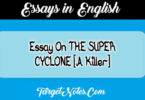
Contents
What do your understand by drama in literature? Give its essential features and elements.
The drama is much earlier creation than fiction and novel. In fact, it discuss the activities performed by human beings and are generally concerned with the basic human instincts. This is why the plots of drama and novel can be interchanged, a drama into an novel and a novel into a drama. But the basic difference between the two is that while fiction is a purely narrative art, the success of drama depend, on its presentation on the stage. So quite naturally, Drama is limited to the stage conditions and the taste of the audience. So drama is not a completely free art, rather it has to observe certain limitations in its theme as well as its structures. A drama cannot be enjoyed without external aid like lighting, stage scenery and rhetoric. While writing a play, the dramatist has to consider the actors, the according to the capacity and number of the actors. Shakespearean plays are very important in this reference. There were no stage decorations so he had to compose poetic lines or dialogues to indicate where a particular scene was being acted.
In order to attract the people to the theatre, he also introduced such vulgar scenes and this is why there is wresting, violence, dancing and many other such devices. The introduction of the ghost, witches and fairies etc. are also employed to satisfy the taste of the people. The role of women in the tragedies has been curtailed for the same reason.
Every dramatic story revolves around some conflict-some clash of individuals or personal interests. In a tragedy this conflict determines the path to catastrophe. It is one the basis of this dramatic conflict that the plot is divided into certain parts-exposition, complications, crisis or turning point, denouement and catastrophe. This division is very normal in full length plays and the play is accordingly divided into the acts. Exposition covers that part of the play in which the conflict originates and it is introduced in the first act. It imparts to the audience all that information which is necessary for the proper understanding of the play. It introduces all the important characters directly or indirectly, their life and circumstances. Our curiosity is thus aroused in the very beginning. The incidents that have already happened before the play begins are also told to the audience.
In complication, the conflict takes a definite shape. Every incident is the natural result of all that has happened earlier. Iago has started hatching intrigue against Othello. Cassio and Desdemona and uses Roderigo as his instrument. The dramatist here hints at those elements which have to become important in the future action. The conflict grows deeper and deeper. The complication generally covers the second act and some part of the third. In Macbeth, Duncan’s sons have run away and Macbeth is crowned Macduff violates his orders and consequently he decides to kill him. In Macbeth internal conflict has also been indicated. Thus both external and internal conflicts take place is this part. The crisis marks the turning point in the conflict. The contending forces obtain such a controlling power that its ultimate success is assured. It takes the whole action towards catastrophe. It is generally placed in the middle or a little beyond the middle.
Our dramatic interest is greatly enhanced when we find a situation of one part repeated in the other. It brings about the element of universality in the play and makes it psychologically more effective Shakespeare has frequently adopted this method in his tragedies and comedies both. There is generally a sub plot in which the parallel action of the main plot is repeated we see in King Leadared As You Like It.
But the principle of contrast is more important than this element because if forms the backbone of the drama. We notice that in a drama the end is quite contrasted to the beginning and in a tragedy it is more deeply effective.
The three unities of time, place and action have their own importance in the composition of a drama and their importance has been recognised in the Greek drama first of all. Aristotle emphasised that there must be a unity in the action and that it must be organic.
Related Link
- Write a short note on narrative technique of a novel.
- What do you understand by Novel? What are the elements which are to considered in plot construction.
- Define Growth of Post-colonial Literature: Feminism, Post-Modernism & Important Facts
- Define The Poetic Drama & Important Facts
- What is Epic Theatre & its Important Facts?
- What is The Expressionism & Important Facts to Remember?
- What is the Theatre of the Absurd & Important Facts
- Define Drama of Ideas & Important Facts.
- Define The Problem Play & Important Facts.
Disclaimer






